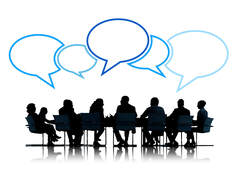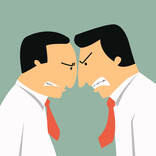 I know — it’s been a l-o-n-g time since I’ve posted a blog. Not because I don’t have something to say — that’s never a problem! It’s simply been a lack of time. Okay, perhaps more like a lack of time management. But the need is still there. The need to connect people, particularly employees in the workplace. One would think that connecting employees and D&I in general would be getting easier. After all, Corporate America is certainly spending the money! A couple of years ago, a SHRM study reported diversity-department budgets at Fortune 1000 firms averaged about $1.5 million per year (it was a wide range, from $30k up to $5 million!). My guess is that average is even higher now. But what do we have to show for all that spent money? Maybe some of us are a little more aware of our unconscious biases? During most of my current keynote presentations, I ask the audience if we’re more divided now than ever and virtually every hand shoots into the air. Race, politics, MASKS! Everyone has an opinion and we’re having trouble expressing that opinion with civility! I think the solution is in our minds. We can all learn about Diversity, Equity, Inclusion, and Belonging but until we BELIEVE in it, not much will change. Actually, it’s not belief in DEIB, it’s belief in people. It’s a mindset that people are great and everyone has something to offer. I wrote a blog last year that focused on inspirational people quotes. Sayings that focus on the uniqueness of people and how each one of us is special in our own way. That blog offers lots of wisdom but for me, one quote stands out: "As human beings, our job in life is to help people realize how rare and valuable each one of us really is, that each of us has something that no one else has – or ever will have – something inside that is unique to all time. It’s our job to encourage each other to discover that uniqueness and to provide ways of developing its expression." Do those words inspire you as they do me? Do they challenge you to look at others as special and unique? I hope so! Those words certainly challenge me to see the best in others. They also inspire me to work even harder at building cultures where people are valued. I'm inspired to help people connect to each other, particularly people who see life differently, and help them work through their differences in a civil manner. So I'll continue my culture and people work throughout this year: keynote presentations, training workshops, emceeing corporate events, moderating panels, conducting culture studies. I'll also write a lot, tweet a lot, and drop in a few videos here and there. And maybe, just maybe — when I ask people at the end of 2022 if they think the world is as uncivil as ever, just a few less hands will shoot up. I’m here to help! I deliver keynotes, develop and deliver training workshops, moderate
panels, and emcee/facilitate Town Halls and other corporate and employee events. If you’d like to explore ideas to build a Value Others Culture, please don’t hesitate to contact me!
0 Comments
 “You can only understand people if you feel them in yourself.” That’s a quote by American author and Nobel Prize in Literature winner John Steinbeck. And it’s one of several quotes I share during my “ Value Others" keynote in order to highlight a specific point. After hearing this keynote address, a professional speaker offered this advice, “You shouldn’t use other people’s quotes. Make up your own.” While I truly value suggestions and critiques of my abilities (without them I could never improve), I think finding inspiration from others is a great way to “lower the heat” as we explored in my last blog. So for this entry, we’re going to explore People, Human Connection, Diversity, Civility, and Personal Growth by hearing from others. I hope you find them as inspiring as I have. And someday, maybe, just maybe, someone will deliver a presentation or write a blog that includes a quote from Darren K. Ford! On helping and understanding and caring for others “To handle yourself, use your head. To handle others, use your heart.” - Eleanor Roosevelt “Remember this. Hold on to this. This is the only perfection there is, the perfection of helping others. This is the only thing we can do that has any lasting value or meaning. This is why we’re here.” - Andre Agassi On connecting with others "As unique as we all are, an awful lot of us want the same things. We want to shake up our current less-than-fulfilling lives. We want to be happier, more loving, forgiving, and connected to people around us." - Brené Brown “Even a brief interaction can change the way people think about themselves, their leaders, and the future. Each of those many connections you make has the potential to become a high point or a low point in someone’s day.” - Douglas Conant Each of us is special and unique "As human beings, our job in life is to help people realize how rare and valuable each one of us really is, that each of us has something that no one else has – or ever will have – something inside that is unique to all time. It’s our job to encourage each other to discover that uniqueness and to provide ways of developing its expression.” - Fred Rogers “There are two statements about human beings that are true: that all human beings are alike, and that all are different. On those two facts all human wisdom is founded.” - Mark Van Doren Civility “Show respect even to people who don’t deserve it; not as a reflection of their character, but as a reflection of yours.” - Dave Willis “Civility costs nothing, and buys everything.” - Mary Wortley Montagu Diversity “When we’re talking about diversity, it’s not a box to check. It is a reality that should be deeply felt and held and valued by all of us.” - Ava DuVernay "We have no hope of solving our problems without harnessing the diversity, the energy, and the creativity of all our people.” - Roger Wilkins Always be growing -- be open to change "If we are learning each day, then today is the dumbest day of the rest of our lives. Remain open to other perspectives to ensure you are smarter tomorrow.” - Lee J. Colan, Ph.D. “The minute that you’re not learning I believe you’re dead.” - Jack Nicholson I hope you find these quotes inspiring and words you commit to living each and every day. I’m confident that these statements, if applied to our lives, would heal our country, bring us back together, and make live more enjoyable for all. To close out this blog entry, let me leave you with possibly my favorite quote by Carl Rogers: “People are just as wonderful as sunsets if you let them be. When I look at a sunset, I don’t find myself saying, 'Soften the orange a bit on the right hand corner.' I don’t try to control a sunset. I watch with awe as it unfolds.”  We’re not getting along. Whether it’s politics, race, religion, culture, immigration, gay marriage, current events, BLM, or just about any other topic you can name, we all have a differing opinion. Our opinions are based on what we know (or what we think we know) and what we believe. Those beliefs are formed over a lifetime of experiences (we explored our complicated selves in a couple of recent blogs — click here to see "I Am My Life - Part 1") and delivered in a way that reflects our personality, some softly with others being very loud about their opinions. We’re often letting those opinions be known in pubic spaces, on TV and radio, at church, and during family gatherings. Probably the largest platform for airing our viewpoints is social media including Facebook, Instagram, LinkedIn, and Twitter, which can be over the top with emotional and often ugly comments. Those over-the-top social media comments are just a small part of the incivility we’re seeing today. In fact, most people would agree that incivility has never been higher. I don’t mean the rioting that plagued many cities in 2020 although that is certainly a reflection of our disagreements. I’m talking about the inability to engage in meaningful dialogue about the issues we’re facing as a nation. We simply can’t seem to have real, honest, uncomfortable conversations that can either help change someone’s mind or at least help people gain an understanding of others and grow in empathy for people who are different. So how do we overcome this standoff? How do we stop yelling at each other and start talking to each other? When will we stop calling each other names and start calling each other brother and sister and friend? I think we’ll do this when business starts facilitating those difficult conversations. Why Business? We tend to hang with “people like us.” That’s certainly true with family. Yes, today’s political climate has driven a wedge between some family members. For the most part, though, family sticks together. Our friends tend to look and think like us as well. That describes my friends. I have a close group of six or seven guys that I hang with, drink bourbon with, and generally do life with. Our wives are all friends so we also do things as couples. Many churches look the same as well. I live in Lewisville, Texas, a North Dallas suburb and while my church is open to anyone and proactively reaches out to the Hispanic community, it’s still a predominately white church. Then there’s business. Business is different. While our family and social groups are often a reflection of ourselves, business usually has a different look and feel. Business is comprised of people from all walks of life. In addition to different genders and generations, employees also represent different ethnicities, different sexual preferences, different educations, different backgrounds, different political beliefs, and different thinking styles. The differences go on and on and on and . . . Yes, families, friends, and social groups can be a melting pot of different people, but it’s business that truly brings dissimilar people together. It’s Too Hot So business has the opportunity — some would say responsibility — to help lower the temperature of our personal interactions and, ultimately, our society. “Lower the temperature.” That’s a great term, isn’t it? I wish I had come up with that but I must give credit to a fantastic professional speaker, Michael Hoffman (click here to learn more about Michael). Michael expertly applies that term to organizations that want to deliver great customer service. I don’t think Michael would mind if I adopted that term to describe our current culture, which is red hot, and how companies can cool things down a bit by helping employees understand each other and talk — calmly — to one another. I’m not the only person who proposes business take the lead here. At a Ken Blanchard conference in 2018, I heard author Brené Brown urge companies to facilitate those uncomfortable conversations within the workforce in order to attract and keep the best employees. So business has a vested interest in facilitating those challenging conversations; it’s a real business advantage! My Passion That’s my goal with this blog and with everything I do; my raison d’être. I want to help people find success and gratification in their daily activities by helping employees understand each other and get along. I want to “lower the temperature” in corporate cultures. So "Getting Along" will be my theme for the rest of 2021. Throughout the year, we’ll explore Diversity, Equity, & Inclusion. We’ll dive into one of my keynote presentations about Building a Value-Others Culture. We’ll touch on civility, challenging conversations, and how to interact with people who are different than ourselves. I hope you’ll follow along throughout the year. And I really hope you’ll interact, provide comments, ask questions, push back (just a little), and challenge me. And hopefully, with each blog, comment, and story, the pebbles we throw into the “pond of life” will create ripples that benefit others, ultimately making our businesses more engaging and satisfying. And making life just a little bit easier.  When do we start hating each other? We come into this world with a natural bent for connection to each other, caring for each other, and loving each other. Sadly, for many people, at some point in life, that connection turns into defriending on Facebook. Caring for a neighbor turns into yelling at the neighbor. And love turns into a cold shoulder or perhaps even into hatred. When does that happen? As mentioned above, we start life by seeing everyone as a friend. We don’t care what you look like, the color of your skin, if you’re a boy or girl, or how you talk. We’re simply born to care and connect. We get a little older, we start school, we begin playing sports. Still friends? Of course! We may play on different Little League or soccer teams, and for a couple of hours we’re “enemies” on the diamond or pitch, but after the game, we’re back to hanging out with each other.
As we pass through middle school, high school, and into college, we may start separating based on our personalities and life plans, but we can still be friends. Yes, we begin hanging out with “people like us”, but no one really hates each other. “Jocks”, “theater” kids, “bandies” (I played percussion in the marching band), or college rivals — we have our differences but we certainly don’t hate one another. Then we’re adults! We have jobs. We have kids. Eventually grandkids. Retirement. We (hopefully) have a long, full life! Elephants and Donkeys So what gets in the way? I mean, we all have likes and dislikes. But do we really need to yell at each other or defriend our BFFs? Seems like we've been drifting apart for the last 10 or 15 years, maybe more. Religion. Gay marriage. International conflicts. But it's politics that has really divided us, and one person in particular. We’re in such a bad place, even family members are separated! In fact, the day after last year’s election, I read a Twitter comment that said, "I can’t believe my mom voted for Trump. I’m sorry but she’s now dead to me.” Seriously? Because you disagree with how dear ol’ mom voted, she’s now dead to you? And I’ve seen numerous tweets stating how much people hate President Trump. Oh yeah, they hate me also because I voted for him. Really? You hate me? But you don’t even know me. Now What? Politically, we’re more divided than ever. But it may be religion, race, gender, generation, or any other issue that gets in the way of a relationship. Regardless, how do we heal as a country? How can we stop yelling at each other and get back to our “days of youth” when we just enjoyed being together? I think two simple steps will help us come together as individuals and as a nation. Step 1: View people as unique and special It truly starts with a choice. What do you think of others? This is particularly true with people who are different than you and was clearly seen during last year’s election. If you voted for Trump, you were a racist. You were homophobic. You were anti-immigration and anti-science. There was no room for policy debate — you were simply a bad person. In fact it was so bad, one person tweeted that all Trump supporters were “pollution.” Is it possible that people who voted for Trump are actually good people, they simply have a different idea of how to run the government? So it’s a choice you make, to look at people either suspiciously or as a person who has wants, desires, career aspirations, a family, and is making their way through this challenging world. Each person you encounter is unique. There is no one exactly like that person anywhere in the world. Choosing to see that person as an individual and valuing them simply for their uniqueness is a choice. Your connection or relationship to that person starts with that decision. Step 2: Listen and Be Open When you encounter that person, listen. I’m not talking about listening with your ears and practicing “active listening.” Yes, this is important. Asking clarifying questions, and giving “body language” feedback through eye contact and head nods lets your discussion partner know you’re engaged in the conversation. Listening with your ears is important. Listening with your heart is critical. Seek to understand how the other person is feeling. Seek to truly understand how life experiences have led this person to this place. In other words, show empathy. Many people describe empathy as “walking in someone else’s shoes.” Not a bad description but let’s face it, there’s no way we can actually do that. We can’t “re-live” someone else’s life. We can’t experience their situations and their feelings. But we can work really hard at understanding their life journey. I recently heard Erin O’Malley talk about this on a LI post. She said it’s not walking in someone else’s shoes, but it is finding out where those shoes have been! And that takes a willingness to invest the energy into that relationship and a willingness to perhaps change your mind a bit. We live in such a polarized world these days and think “the other side” just doesn’t get it. But the willingness to deeply understand someone else’s view and acknowledge that not only is it okay for them to feel and think that way but maybe their perspective is right! Or, at the very least, find the common ground that you can both stand on. Once you’re on that common ground, leave the differences behind, even if momentarily. Build on that common ground through “life” conversations about families, favorite movies, vacation spots, and food. You’ll soon recognize that you aren’t enemies. While the differences are still there and may always remain, you’ll recognize that you don’t have to yell at each other. By the way, if you’ll have those conversations over coffee or maybe a sweet dessert, you may hang out on that common ground just a little bit longer! Is there someone in your life who thinks differently than you do? Invite that person to share over coffee or something sweet — and find that common ground! |
AuthorWrite something about yourself. No need to be fancy, just an overview. Archives
April 2021
Categories |
About DarrenDarren is a personable, high energy, and engaging speaker who will inform, inspire, and entertain your audience, Read More
|
Quick Links |
stay connected |
